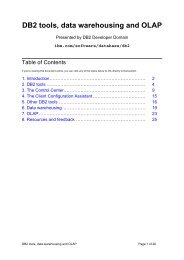You also want an ePaper? Increase the reach of your titles
YUMPU automatically turns print PDFs into web optimized ePapers that Google loves.
74 Everything You Ever Wanted to Know About DVD<br />
$100 more than a regular player, had to be hooked up to a phone line so it<br />
could call an 800 number for about 20 seconds during the night once each<br />
month (or after playing 10 or so discs) to upload billing information.<br />
Most Divx discs could be converted to DivxSilver status by paying an<br />
additional fee (usually $20) to allow unlimited plays on a single account (as<br />
of December 1998, 85 percent of Divx discs were convertible). Unlimitedplayback<br />
DivxGold discs were announced but never produced.<br />
Divx players can also play regular DVD discs, but Divx discs do not play<br />
in standard DVD players. Divx discs are serialized with a barcode in the<br />
standard burst cutting area. In addition to normal DVD copy protection<br />
(refer to “What Are the Copy Protection Issues?” in <strong>Chapter</strong> 1), they employ<br />
watermarking the video, modified channel modulation, and triple Data<br />
Encryption Standard (DES) encryption (two 56-bit keys) of serial communications.<br />
Divx technology never worked on PCs, which undoubtedly contributed<br />
to its demise. Because of the DES encryption, Divx technology may<br />
not have been allowed outside the United States.<br />
Divx was originally announced for summer 1998 release. Limited trials<br />
began on June 8, 1998, in San Francisco and in Richmond, Virginia. The<br />
only available player was from Zenith (which at the time was in <strong>Chapter</strong> 11<br />
bankruptcy), and the promised 150 movies had dwindled to 14. The limited<br />
nationwide rollout (with one Zenith player model and 150 movies in 190<br />
stores) began on September 25, 1998. By the end of 1998, about 87,000<br />
Divx players (from four models available) and 535,000 Divx discs were sold<br />
(from about 300 titles available). The company apparently counted the 5<br />
discs bundled with each player, which means 100,000 additional discs were<br />
sold. By March 1999, 420 Divx titles were available (compared to over 3,500<br />
open DVD titles). All things considered, Divx players were selling well and<br />
titles were being produced with impressive speed.<br />
On June 16, 1999, less than a year after initial product trials, Circuit City<br />
withdrew its support and Divx announced it was closing down. Divx did not<br />
confuse or delay development of the DVD market nearly as much as many<br />
people predicted (including yours truly). In fact, it probably helped by stimulating<br />
Internet rental companies to provide better services and prices, by<br />
encouraging manufacturers to offer more free discs with player purchases,<br />
and by motivating studios to develop rental programs.<br />
When it closed down, the company offered $100 rebate coupons to all<br />
owners of Divx players. This made the players a good deal, because they<br />
could play open DVDs just as well as other low-end players that cost more.<br />
On July 7, 2001, Divx players dialed into the central billing computer, which<br />
decommissioned them. (Divx players not connected to phone lines have<br />
expired their playback allowance.) Consequently, Divx discs are no longer<br />
playable in any players. For more information see the Divx Owner’s Association<br />
(www.the-doa.com).



